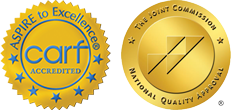People with substance use disorders are at a higher risk of developing mental and behavioral health conditions, such as anxiety and mood disorders, major depressive disorder, bipolar disorder, post-traumatic stress disorder, and attention deficit hyperactivity disorder.
The coexistence of a mental illness and substance abuse is called dual diagnosis or co-occurring disorders. The Substance Abuse and Mental Health Services Administration (SAMHSA) estimates that about 21.5 million Americans are living with co-occurring substance use and behavioral health / mental health disorders.
Coexisting substance use disorders and mental health disorders can cause worsening of symptoms of the other disorder. For instance, a person might experience worsening substance use to cope with a severe depressive episode. Or increasing substance abuse might worsen symptoms of anxiety.
Seeking specialized care at dual diagnosis treatment centers is critical if you want to successfully treat co-occurring disorders. Healthcare providers who administer dual diagnosis treatment programs have expertise in managing both types of conditions.
This article will discuss the importance of attending dual diagnosis programs if you or a loved one has co-occurring disorders.
What is a Dual Diagnosis Rehabilitation Center?
A dual diagnosis rehabilitation center is a specialized treatment facility that addresses both mental / behavioral health disorders and substance use disorders simultaneously. People with dual diagnoses have co-occurring conditions, such as anxiety, depression, or bipolar disorder, alongside an addiction to drugs or alcohol. Dual diagnosis rehabilitation centers offer integrated care to target both conditions together, rather than treating them separately.
Key features of dual diagnosis treatment centers include:
- Comprehensive assessment by trained mental health professionals to identify mental health issues and substance use disorders.
- Integrated treatment with combined therapies such as counseling, medication management, and addiction treatment.
- Personalized care with tailored treatment plans that address the unique needs of people with mental health disorders and substance abuse.
- Support for relapse prevention with focused strategies to address triggers related to both mental health and addiction issues.
Dual diagnosis programs are administered by a multidisciplinary team of doctors, therapists, counsellors, addiction specialists, and social workers to provide holistic care.
Understanding Dual Diagnosis
Dual diagnosis refers to a situation where a person has a mental health disorder and a substance use disorder at the same time. These two conditions often interact with and worsen each other, making diagnosis and treatment more complex and challenging. Co-occurring substance abuse and mental health issues are common because people might use substances to self-medicate for mental health issues, or substance abuse might lead to the development or worsening of mental health disorders.
Why Dual Diagnosis is Complex
- Self-medication: People with mental health disorders often use substances to cope, which can lead to dependence and addiction.
- Interconnected symptoms: Symptoms of mental health conditions and substance use disorders can overlap, making diagnosis and treatment challenging.
- Relapse risk: Treating only one issue (for example, addiction) without addressing the mental health disorder increases the risk of relapse.
Treatment for dual diagnosis or co-occurring disorders therefore requires integrated care, where both the mental health condition and substance use disorder are treated together through therapy, medication, and support systems. This type of treatment is offered at specialized dual diagnosis treatment centers.
How Do You Know If You Have a Co-Occurring Disorder?
You might suspect a co-occurring disorder (also known as dual diagnosis) if you are experiencing symptoms of a mental health disorder and a substance use disorder. Here are some signs and symptoms to help you identify if you might have a co-occurring disorder:
Mental Health Symptoms:
- Persistent feelings of sadness or hopelessness
- Extreme mood swings (highs and lows)
- Anxiety, panic attacks, or constant worry
- Difficulty concentrating, making decisions, or remembering things
- Withdrawal from friends, family, and activities you once enjoyed
- Changes in appetite or sleep patterns
Substance Use Symptoms:
- Using substances more frequently or in larger amounts than intended
- Having strong cravings for a harmful substance
- Neglecting responsibilities at work, school, or home due to substance use
- Experiencing withdrawal symptoms when not using the substance
- Continuing to use substances despite negative consequences (health problems, legal issues, relationship problems)
Steps to Determine If You Have a Co-Occurring Disorder
Self-Reflect
Take time to reflect on your emotional and behavioral patterns. Are you experiencing distressing mental health symptoms while also struggling with substance use? (See above lists of common symptoms).
Keep a Journal
Document your mood changes and substance use in a journal. This will help you understand how they affect your daily life as well as recognize patterns and triggers.
Seek Professional Evaluation
Consult with a mental health professional or addiction specialist. A healthcare provider can perform a comprehensive assessment to evaluate both mental health issues and substance abuse.
Use Screening Tools
Online screening tools and questionnaires are designed to help people assess their mental health and substance use. These can be a good starting point for identifying potential co-occurring disorders.
Reach Out for Support
Talk to trusted friends, family members, or support groups about your experiences. Sometimes, loved ones can notice changes that you may overlook.
When to Seek Professional Help?
If you notice any signs of mental health issues or substance abuse that are affecting your daily life, relationships, or well-being, seek help, sooner rather than later. Early intervention can lead to more effective treatment and better outcomes. Mental health professionals can provide the necessary support and resources to help you manage and recover from both conditions – mental health conditions and substance abuse.
What Are the Most Common Co-Occurring Disorders?
Co-occurring disorders are the simultaneous presence of a mental health disorder and a substance use disorder. Here are some of the most common combinations of co-occurring disorders:
Depression and Alcoholism
A person might turn to alcohol to cope with symptoms of depression, such as sadness, lack of motivation, or hopelessness. Over time, this can lead to alcohol dependence, while the underlying depression remains untreated, or even worsens.
Anxiety Disorders and Substance Use
Conditions like generalized anxiety disorder (GAD), panic disorder, or social anxiety disorder often co-occur with substance abuse. For instance, someone with severe anxiety might misuse prescription drugs like benzodiazepines (e.g., Xanax or Valium) to calm their nerves. However, these medicines are habit-forming. Long-term use or misuse of anti-anxiety drugs can lead to addiction, while the anxiety may persist or even worsen due to dependence.
Bipolar Disorder and Substance Abuse
People with bipolar disorder may engage in substance use, such as crack/cocaine use, during manic episodes (to enhance euphoria) or during depressive episodes (to self-medicate). This can worsen mood swings and complicate treatment for bipolar illness.
Post-Traumatic Stress Disorder (PTSD) and Drug Use
People with PTSD may use substances like alcohol, opioids, or marijuana to numb emotional pain or avoid traumatic memories. But experts strongly advise against self-medication. Long-term use of drugs and alcohol can be harmful to health and lead to addiction, while leaving PTSD symptoms unaddressed.
Schizophrenia and Substance Use
People with schizophrenia may turn to drugs or alcohol to cope with symptoms like delusions or hallucinations. But substance use can worsen symptoms and complicate treatment.
Eating Disorders and Substance Abuse
Disorders like anorexia or bulimia can co-occur with substance use, particularly stimulants (to suppress appetite) or alcohol (to cope with emotional distress). This combination can severely impact physical and mental health.
Personality Disorders and Substance Use
Personality disorders like borderline personality disorder (BPD) or antisocial personality disorder may be associated with higher rates of substance abuse. People with these mental health conditions may use substances to manage the intense emotions associated with them.
Attention-Deficit/Hyperactivity Disorder (ADHD) and Substance Use
People with ADHD sometimes misuse prescription stimulants or other substances to manage symptoms like impulsivity and inattention. However, taking prescription ADHD medications such as Adderall or Ritalin without a prescription and medical supervision by a healthcare professional can lead to addiction and increased difficulties in managing ADHD symptoms.
Types of Treatment in Dual Diagnosis Programs
Effective treatment of co-occurring disorders requires an integrated treatment approach, where both the mental health and substance use issues are treated simultaneously. This often includes therapy, medication management, and support groups tailored to your unique needs. If you or a loved one has a co-occurring disorder, seek professional help. Some of the types of treatments in dual diagnosis programs include:
Dual Diagnosis Detox
Detoxification (detox) is the initial step in the recovery process for people with substance use disorders and co-occurring disorders. It involves managing withdrawal symptoms under medical supervision and allowing the body to clear itself of harmful substances.
Key Features of Dual Diagnosis Detox
- Medical Supervision: Detox is typically done with medical supervision to ensure safety. Healthcare providers can manage withdrawal symptoms with the use of prescription medications and other support services. This may involve the use of medications to ease discomfort, reduce cravings, and treat symptoms of a co-occurring mental health condition that might worsen during detox.
- Integrated Assessment: During detox, healthcare professionals assess both the substance use and mental health conditions and plan the best course of treatment post-detox.
- Supportive Environment: Dual diagnosis detox ensures that you receive emotional support through individual counseling or group therapy sessions during the detox process to address any mental health symptoms that may arise.
Inpatient Dual Diagnosis Treatment
Inpatient dual diagnosis treatment refers to residential dual diagnosis programs where you stay at a facility for intensive treatment.
Key Features of Inpatient Dual Diagnosis Programs
- Structured Environment: Inpatient programs provide a highly structured and supportive environment, which is beneficial if you have severe symptoms or are not able to maintain sobriety in a community or outpatient setting.
- Comprehensive Treatment: Dual diagnosis inpatient programs typically include therapy (individual and group), medication management, life skills training, and other holistic approaches (such as art or music therapy).
- 24/7 Support: Continuous support from a multidisciplinary team of healthcare professionals, including doctors, therapists, counselors, and nurses is available to address both mental health and substance use issues.
- Crisis Management: Inpatient facilities are equipped to handle psychiatric emergencies and provide immediate care for mental health crises.
Outpatient Dual Diagnosis Treatment Programs
Outpatient dual diagnosis treatment allows you to receive care while living at home or in some other supportive environment, making it a flexible option.
Key Features of Outpatient Dual Diagnosis Treatment
- Flexible Scheduling: Outpatient programs typically offer various schedules (day or evening therapy sessions), allowing you to continue working or attending school while receiving treatment.
- Individualized Care Plans: Dual diagnosis treatment plans are tailored to meet your specific needs and may include therapy, medication management, and support groups.
- Access to Support Services: You can benefit from counseling, support groups, and educational workshops without the need for inpatient rehab.
- Gradual Transition: Outpatient dual diagnosis programs can serve as a step-down from inpatient care, allowing you to transition back to daily life while still receiving some level of support for addiction treatment and mental health issues.
Dual Diagnosis Treatment Aftercare
Aftercare is a vital component of the recovery process for people with dual diagnosis (co-occurring mental health and substance use disorders). After completing a primary treatment program, effective aftercare helps maintain sobriety, manage mental health symptoms, and build a supportive network. Here’s an overview of the different types of dual diagnosis treatment aftercare:
Weekend stays at a rehab center
Weekend stays at a dual diagnosis rehabilitation center can serve as a bridge between inpatient treatment and independent living.
Key Features:
- Continued Support: Weekend stays allow you to benefit from structured support while gradually transitioning back into your daily life.
- Therapeutic Activities: These stays may include group therapy sessions, workshops, and individual counseling to reinforce skills learned during primary mental health and addiction treatment.
- Relapse Prevention: Weekend stays at dual diagnosis rehab centers offer a controlled environment to practice coping strategies and deal with triggers while still receiving professional support and supervision.
Transition to a sober-living facility
Sober-living facilities provide a safe living environment for people recovering from substance use and mental health issues.
Key Features:
- Structured Environment: Sober living facilities provide an alcohol- and drug-free living environment where you can work on recovery while going back to living independently.
- Peer Support: You can share experiences and support one another, which helps to develop a sense of community and encourages accountability.
- Life Skills Development: Many sober-living programs include life skills training, job readiness programs, and financial management education to prepare you for life after addiction treatment.
Regular therapy sessions
Regular therapy sessions are essential for maintaining mental health and sobriety.
Do you have a loved one struggling with addiction?
We know how hard that can be. Give us a call to find out what options you have.
Key Features:
- Individual Therapy: One-on-one therapy sessions allow you to continue the work done during treatment to address ongoing issues related to your mental health and substance use.
- Adjustment in Treatment Plans: Your therapists can monitor your progress and adjust your treatment plans as needed, ensuring you have the ongoing support necessary to navigate new challenges.
- Coping Strategies: Therapy sessions help you develop and reinforce coping strategies to manage triggers, stress, and drug cravings as you move back towards routine life.
Group therapy
Group therapy is a fundamental component of aftercare in dual diagnosis programs and provides an opportunity for shared experiences and mutual support.
Key Features:
- Peer Support: Group therapy allows you to connect with others who share similar experiences, creating a sense of belonging and reducing feelings of isolation.
- Skill Sharing: You can share coping strategies, successes, and challenges with other participants and learn from one another’s experiences.
- Facilitated Discussions: Trained facilitators guide discussions, ensuring a safe and supportive environment where you can openly discuss your feelings and experiences related to both mental health and substance use.
Scheduled drug testing
Scheduled drug testing is a proactive measure to help maintain sobriety post-addiction treatment.
Key Features:
- Accountability: Regular drug testing can help you stay accountable for your recovery and reduce the temptation to relapse.
- Monitoring of Progress: Healthcare providers can monitor substance use patterns and address any emerging issues quickly before they become bigger problems.
- Building Trust: Drug testing during aftercare for dual diagnosis treatment helps to build trust between people in recovery and their support network, reinforcing their commitment to sobriety.
Benefits of Dual Diagnosis Treatment
The key benefits of seeking care at dual diagnosis rehabilitation centers include:
- Comprehensive Care: Healthcare professionals at dual diagnosis treatment centers are trained to address both conditions simultaneously, providing a holistic approach that recognizes the interconnectedness of mental health and substance use issues.
- Improved Outcomes: Integrated treatment increases the likelihood of successful recovery and reduces the risk of relapse compared to treating each disorder separately.
- Personalized Treatment Plans: Providers at dual diagnosis rehabilitation centers can tailor interventions to meet your unique needs, accounting for your specific mental health symptoms and substance use patterns.
- Enhanced Support Systems: Dual diagnosis programs give you access to various therapeutic modalities, including individual therapy, group therapy, and peer support, thereby providing comprehensive and holistic care for your co-occurring disorders.
- Skill Development: You can learn coping strategies, life skills, and relapse prevention techniques that are essential for long-term recovery.
- Better Management of Symptoms: Mental health professionals at dual diagnosis treatment centers can stabilize your symptoms from a mental health condition, which can lower the likelihood of substance use as a coping mechanism.
- Continuous Monitoring: Dual diagnosis rehab facilities offer ongoing evaluation of both mental health and substance use, allowing for timely adjustments in treatment as needed.
How Much Does Dual Diagnosis Treatment Cost?
The cost of dual diagnosis treatment can vary widely based on several factors, including the severity of your mental health issues and substance use disorder, the type of treatment facility, the geographical location, duration of treatment, and individual needs. Here’s an overview of potential costs associated with different aspects of dual diagnosis treatment:
Dual Diagnosis Detoxification Programs
- Cost Range: Typically ranges from $300 to $800 per day.
- Factors Affecting Cost:
- Medical supervision required
- Duration of detox
- Types of substances involved
Dual Diagnosis Inpatient Treatment
- Cost Range: Typically ranges from $500 to $2,000 per day.
- Factors Affecting Cost:
- Length of stay (often several weeks to months)
- Facility amenities and level of care (luxury vs. standard facilities)
- Type of therapies offered
Dual Diagnosis Outpatient Treatment
- Cost Range: Generally ranges from $100 to $500 per session.
- Factors Affecting Cost:
- Frequency of sessions (weekly vs. biweekly)
- Type of therapy (individual vs. group)
- Location and provider rates
Dual Diagnosis Sober Living Facilities
- Cost Range: Generally ranges from $500 to $2,500 per month.
- Factors Affecting Cost:
- Location and amenities
- Length of stay
- Included services (e.g., meals, transportation, therapy)
Ongoing Therapy and Counseling for Dual Diagnosis Disorders
- Cost Range: Individual therapy may cost between $100 and $250 per session.
- Factors Affecting Cost:
- Therapist qualifications and experience
- Length of sessions
- Location of practice
Insurance Coverage for Dual Diagnosis Treatment
Many health insurance plans cover some aspects of dual diagnosis treatment, which can significantly reduce out-of-pocket costs. Coverage may vary based on:
- Type of insurance (private, Medicaid, Medicare)
- Policy specifics (deductibles, copays, coverage limits)
- In-network vs. out-of-network providers
Tips on Identifying the Best Dual Diagnosis Treatment Centers
Choosing the right dual diagnosis treatment center is vital for effective recovery from co-occurring mental health and substance use disorders. Here are some tips to help you identify the best dual diagnosis rehabilitation centers:
Accreditation and Licensing
Ensure the facility is accredited by recognized organizations (e.g., Joint Commission, CARF) and has the necessary state licenses to provide mental health and substance use treatment.
Specialization in Dual Diagnosis
Look for rehabilitation centers that specialize in dual diagnosis treatment, as they are better equipped to handle the complexities of co-occurring disorders.
Qualified Staff
Research the credentials of the treatment team, including psychiatrists, psychologists, addiction specialists, and licensed therapists. A multidisciplinary approach is the most beneficial for people with co-occurring disorders.
Integrated Treatment Approach
Check if the center employs an integrated treatment model that addresses both mental health and substance use issues simultaneously, using evidence-based therapies.
Customized Treatment Plans
Ensure that the dual diagnosis rehabilitation center offers personalized treatment plans tailored to each person’s needs. This is important because each person has unique mental health and substance use challenges.
Therapy Options
Look for dual diagnosis rehabilitation centers that offer a variety of therapeutic modalities, such as individual therapy, group therapy, family therapy, cognitive-behavioral therapy (CBT), and holistic therapies (yoga, mindfulness).
Aftercare Support
Inquire about aftercare programs, including outpatient services, support groups, and relapse prevention strategies to ensure ongoing support after you complete primary treatment for your substance use disorder and mental health condition.
Success Rates and Testimonials
Research the dual diagnosis treatment center’s success rates and read testimonials from former clients to gauge the effectiveness of their treatment programs.
Facilities and Environment
Visit the dual diagnosis rehab center (if possible) to see the facilities and overall environment for yourself. A welcoming, supportive, and safe space can enhance your recovery experience.
Insurance and Payment Options
Check if the dual diagnosis rehabilitation center accepts your insurance and inquire about out-of-pocket payment options, such as sliding scale fees and financial assistance.
Accessibility and Location
Consider the location and accessibility of the dual diagnosis treatment center. A facility that is convenient for you can make it easier to attend sessions and appointments and adhere to the recommended dual diagnosis treatment plan.
Communication and Support
Evaluate the level of communication and support provided by the staff during your inquiries. A responsive and empathetic team is a sign of a supportive treatment environment.
How Discover Recovery Can Help
If you or a loved one is struggling with mental health issues and co-occurring substance use, seeking dual diagnosis treatment can be a vital step toward healing and recovery. Getting specialized care can address both conditions simultaneously, giving you the comprehensive care you need to break the cycle of dependency and emotional pain.
Remember, you don’t have to face this journey alone—professional treatment offers the tools, guidance, and community necessary for lasting change. Taking that first step can lead to a brighter, healthier future filled with hope and renewed purpose. Reach out to Discover Recovery Treatment Center for help today.
Frequently Asked Questions (FAQs)
Who is eligible for treatment at a dual diagnosis rehab center?
Eligibility for treatment at a dual diagnosis rehab center typically includes individuals who:
- Have a Co-Occurring Disorder: A person must be diagnosed with both a mental health disorder (e.g., depression, anxiety, bipolar disorder) and a substance use disorder (e.g., addiction to alcohol, drugs).
- Meet Admission Criteria: Each facility has specific admission criteria, such as age, severity of symptoms, and readiness for treatment.
- Are Motivated for Change: An eligible person demonstrates a willingness to engage in treatment and work towards recovery.
Call us at Discover Recovery Treatment Center today to understand our eligibility requirements and admission process.
How long does dual diagnosis treatment usually last?
The duration of dual diagnosis treatment can vary widely based on individual factors and the severity of the substance abuse and mental health conditions being treated. However, here are some general timeframes:
- Detoxification: This initial phase of addiction treatment typically lasts 3 to 10 days, depending on the substance and individual circumstances.
- Inpatient Treatment: Residential programs often last from 30 days to 90 days, although some individuals may benefit from longer stays (up to six months) for more intensive support.
- Outpatient Treatment: Outpatient programs can vary significantly in length, typically ranging from 8 to 12 weeks, but some people may remain in outpatient care for several months or even years for ongoing support.
- Aftercare: After completing primary treatment, ongoing support through aftercare programs (such as sober living or continued therapy) can last for several months to years, depending on a person’s recovery needs.
Ultimately, the length of dual diagnosis treatment is tailored to your needs and progress in recovery. At Discover Recovery, we do regular evaluations to determine when it’s appropriate for you to transition to less intensive care.
How is the treatment plan customized for each individual?
The treatment plan is customized in dual diagnosis treatment through:
-
- Comprehensive assessment and treatment planning
- Collaboration by a multidisciplinary team
- Setting of personal goals
- Individualized therapeutic approaches
- Adjustments in the treatment plan based on progress
- Inclusion of support systems
- Focus on co-occurring disorders
- Aftercare planning
These elements of dual diagnosis treatment plans help to make the programs personalized and effective, increasing the likelihood of successful and sustained recovery.
Can a dual diagnosis be treated with medication?
Yes, a dual diagnosis can be treated with medication. Psychiatric medications such as antidepressants and mood stabilizers can help to manage mental health disorders, while medications for substance use disorders can reduce cravings and withdrawal symptoms. A healthcare provider can tailor your medication plan to address both conditions simultaneously for optimal recovery.
Is it possible to fully recover from dual diagnosis?
Yes, it is possible to fully recover from a dual diagnosis. Many people with dual diagnosis or co-occurring disorders achieve long-term recovery through comprehensive treatment. The important thing is to address both mental health and substance use disorders at the same time. Success often depends on factors such as the quality of treatment at a specialized dual diagnosis treatment center, ongoing support, and personal commitment to the recovery process.
What is the difference between dual diagnosis and comorbidity?
Dual diagnosis specifically refers to the simultaneous presence of a mental health disorder and a substance use disorder, while comorbidity is a broader term that encompasses two or more medical conditions, which can include multiple mental health disorders or other physical health issues alongside mental health or substance use disorders.
What are the risks of not treating a dual diagnosis?
Not treating a dual diagnosis or co-occurring disorders can lead to worsening symptoms of both the mental health condition and the substance use disorder. This can increase the risk of serious health complications, including overdose and death, repeated relapses to substance abuse, self-harm, legal issues, financial difficulties, and strained relationships. It can also result in long-term complications that can make successful recovery from addiction and mental health issues more challenging over time.





